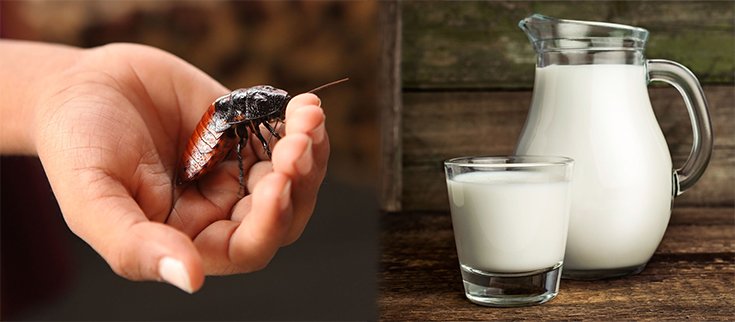Could Cockroach Milk be the Next Superfood?

When you think of superfoods, you probably think of pomegranates, pickles, kombucha,
If you’ve spent your life stomping on cockroaches (or running from them screaming, like I do), this story might not appeal to you, but here goes nothing.
You see, cockroach milk might just be the next big thing in health food, or so say scientists at India’s Institute for Stem Cell Biology and Regenerative Medicine. Who wouldn’t want some of that in a milkshake?
OK, so here’s the disgusting 411 on cockroach milk.
All About the Cockroach Milk
Most cockroaches lay eggs, but the Pacific beetle cockroach gives birth to live young. They also produce food for their offspring, containing tiny protein crystals. Baby cockroaches are fed a liquid substance loaded with fats, sugars, and proteins. For all intents and purposes, this liquid is cockroach milk.
Scientists had always believed baby roaches simply digested this “milk,” but Barbara Stay, a zoologist at the University of Iowa, discovered some of the nutrient-rich crystals tucked inside the embryos, which they feed off of.
Subramanian Ramaswamy, a scientist at the Institute, said:
“We didn’t believe these crystals were actually protein crystals.”
As it turns out, cockroach milk is among the most nutritious and highly caloric substances on earth. In fact, pound-for-pound, cockroach milk crystals contain 3 times more energy than buffalo milk, an analysis by Ramaswamy and his colleagues found.
Roach milk also contains amino acids and 4 times the nutrition of cow’s milk. [2]
Prior to the discovery, buffaloes were at the top of the list when it came to producing a protein with the most calories. [1]
In fact, roach milk might be an environmentalist’s dream. Cow burps spew greenhouse gases into the environment, and growing almonds for almond milk requires tons of water.
Read: Almond Milk: Quite Good for you – Very Bad for the Planet
Crystals spill out of a cockroach embryo, under magnification. Researchers say these protein crystals are the most nutritious substance, per weight, yet discovered. (Banerjee et al./IUCrJ)
Could it be Used for Human Consumption? And Will It?
Ramaswamy said he could see cockroach milk potentially being used in protein drinks, but that would be easier said than done. See, the problem is that roaches don’t have, um, nipples. You can’t milk a roach, per-se. A roach-milk inspired beverage would have to come from yeast, and therein lies the problem.
The yeast would probably have to be bioengineered yeast, which is already used in the food industry. It’s often used in synthetic sweeteners, which are generally products the health-conscious avoid.
And we don’t yet know if the crystals are toxic to humans. So far only 1 person has tasted these crystals. Ramaswamy explained that a colleague of his once tasted some of the milk crystals from a sliced-open Pacific beetle cockroach as restitution for losing a drinking competition at a party. [1]
(Suddenly my college experience seems very boring by comparison.)
Right now, researchers are working to sequence Pacific beetle cockroach genes so they can be reproduced in the lab. [3]
Sources:
[2] Fox News
[3] New York Post

No thanks! I just continue to drink coconut milk and that’s better for me. Lo!
perfect for mars missions.